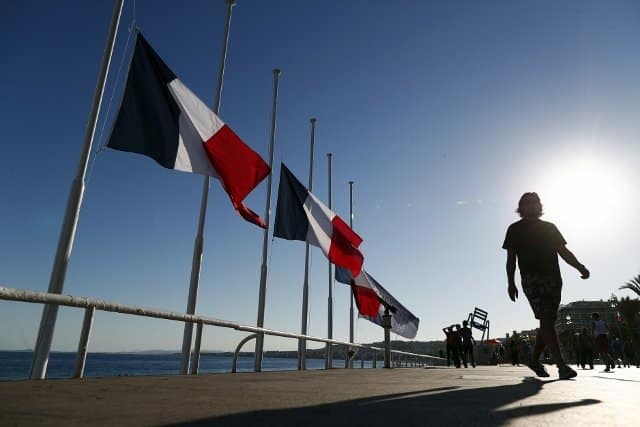I was in Nice on Bastille Day and am lucky to be alive. I have a byline. But the 84 dead, they have no byline.

French flags at half mast on the Promenade des Anglais, Nice, France, 16 July 2016. (EPA/Ian Langsdon)
Two images will not go away. One of a huge white truck, scattering the crowd and hurtling towards us in a clatter of metal.
The other of a family, three or four adults, a small child in a stroller and another, about five years old, getting in the way, to his mother’s irritation. They were at the top of the steps as my wife Sylvie and I climbed up from the beach after watching the Bastille Day fireworks in Nice.
All around us people were chatting in various languages as the fireworks began last Thursday, July 14.
For 25 minutes it continued in a crescendo of whooshes, sparks and color until what the French call the “final bouquet,” a curtain of golden fire descending on the dark waters of the Mediterranean.
The bouquet would have told the truck driver, some two kilometers to the west, that it was time to start his engine, mount the curb onto the Promenade des Anglais — Nice’s long beachfront avenue — and start speeding towards unsuspecting holidaymakers.
Yes, I told the desk editor, we had seen people hit.
By then, Sylvie and I were walking briskly home. Suddenly, about 50 meters away, the truck exploded out of nowhere. Headlights blazing, it weaved from side to side of the Promenade. There was a racket of screeching metal as it smashed into seats, a bicycle stand and the guard rail above the beach.
We had three seconds to throw ourselves to the right into the roadway. The truck thundered past. I put up my left hand to protect my face from a shower of broken glass and plastic.
Shaking with fear, we called our daughter, who was at a party in another part of town, to tell her to stay put.
All around us people were screaming, running. Police sirens began to wail. We rushed to the safety of our daughter’s nearby apartment.
I called Agence France-Presse, where I had spent my career as a journalist, to alert them to the story. The desk editor asked sensible, professional questions. Could I be sure that the truck driver had not lost control of his vehicle? How fast was the truck going? Had I seen people hit?
In the split second after the truck roared past us, I had certainly seen people thrown left and right. It was possible that some, like us, had the time to jump, but surely some must have been hit. After the truck had passed, Sylvie looked back and saw a body, motionless in a pool of blood.
Yes, I told the desk editor, we had seen people hit.
For the first time, I knew that someone wanted to kill me.
Reporters are supposed to have a sense of detachment, but I had never been in a situation like this.
I lived for three years in Lebanon during the civil war and sometimes had to shelter from gunfire. But even when the Israeli army besieged and bombed Beirut in 1982, I never felt I was a target.
On September 11, 2001, I was eight blocks from New York’s Twin Towers Center when they collapsed.
But in Nice, for the first time, I knew that someone wanted to kill me. Not just me, but my wife and thousands of people who had been happily cheering fireworks on a beach front. Young people like my daughter, older people and families with kids in strollers.
I was so shaken that the following day, when we returned to the Promenade, I could not be sure at which point we had had to dive for safety the previous night.
But the byline worries me.
A couple of hours after I alerted AFP, the editor called to ask if they could use my byline (I retired from AFP earlier this year). I said the information I had given was so scant it hardly merited that, but if they wanted to, it was fine by me.
Recounting the story over and over helped me come to terms with what had happened. Some Post Traumatic Stress Disorder experts say it is what enables reporters to go on doing their job. My delivery became more assured. A BBC interviewer complimented me on my “journalist’s eye.” Friends texted me saying I had been quoted in French newspapers.
I felt a certain professional satisfaction in having broken the story, in reacting quickly and as honestly as I could.
But the byline worries me. It seems to make me the focus of the story.
I am extraordinarily lucky to be alive, but this was not about me. It is about the 84 people who died in Nice, three dozen of whom were still unidentified four days later. They have no byline.
 Robert Holloway is News-Decoder Editor. A British-born French citizen, he had a long career at Agence France-Presse as a journalist and editor before becoming director of the AFP Foundation, the international media training arm of the global news agency. He joined AFP in 1988 and served as Sydney bureau chief, foreign editor, head of the English desk in Paris, United Nations correspondent in New York, deputy managing editor and acting editor in chief.
Robert Holloway is News-Decoder Editor. A British-born French citizen, he had a long career at Agence France-Presse as a journalist and editor before becoming director of the AFP Foundation, the international media training arm of the global news agency. He joined AFP in 1988 and served as Sydney bureau chief, foreign editor, head of the English desk in Paris, United Nations correspondent in New York, deputy managing editor and acting editor in chief.
